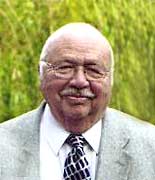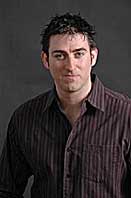by Jack Kennedy
 Donald R. Nuss
Donald R. Nuss
Donald Nuss believes the Bible is not factual or provable, and that passion and reading a lot make him a theologian.
The author of The Anatomies of God, the Bible and Religion: Decoding the Old and New Testaments (iUniverse) is the former CEO of a retail company, a real estate man, a partner in a marina complex and a onetime WWII naval officer. He likes to write. The latest book, following several of the author's earlier novels or fiction tales, is hefty and often pedantic. It does not flow like one of his novels might.
Nuss spends all of his time, bit by bit, Bible book by book, claiming that there is no proof, no substantiated timeline, no recorded record of many of the events Christians hold to the core. In fact, he claims that Christ never intended to found a new religion and never claimed to be the Son of God. Each of the 66 biblical books is scrutinized, secularized and summarized.
Outrageous? Yes, perhaps, but at times fascinating, as the Bible unfolds from the Nuss point of view. Void of the facts he needs to prove his case, his views on 581 pages are indeed uncommon. But if Nuss is not an experienced biblical scholar, he often comes across to, perhaps, even the most dogmatic, conservative reader as more of a skeptic than sinner. He is not an open, avowed agnostic or a bitter atheist. He is not stridently anti-Christ. He claims the Hebrew Bible, the Old Testament, or part thereof, is "an epic history, partially verified," while the Christian New Testament "covers only the biography and teachings of one man," a history chronicled anonymously with no verification or authentication by five authors intent on elevating a proponent of ethical behavior to the status of son of God.
The gospels, in this author's view, "are not balanced biographies." Except for a few snapshots, there is nothing in them about Jesus' first 30 years--his experiences, his public life. Nuss adds, "there is not a single piece of archaeological, forensic or documentary evidence that shows Jesus was alive two thousand years ago."
Greater theologians than Nuss, or this reviewer, might argue differently. That is what makes the book compelling. It is not meant as an attack on spirituality, a clash with Christianity, Nuss concludes, when he says, "I explore the Bible's mystique, reveal its beauty and analyze its contradictions and New Testament mendacity."
Having been privy to the horrors of war, starvation and misery around the world, the author is attempting to answer the question, "Why do the Bible and religion promise much and deliver little?"
The ex-Methodist says, "The world would have been spared centuries of religious intolerance, wars and horror if only Mark, Matthew, Luke and John had been satisfied with Jesus' teachings of love and compassion." He believes that Christianities' crusades, inquisitions and wars were caused by the Gospel's false authority given to Christian church leaders.
The hefty volume includes sections on differences between the ancient Hebrew and Greek cultures, an appendix summarizing and comparing Jesus, Krishna and Buddha and their similar paths as religious leaders; a bit on Thomas Jefferson's letter to his nephew, Peter Carr on Jesus' teachings in which he says "you must set aside all prejudice on both sides and neither believe nor reject anything...Your own reason is the only oracle given you by heaven." There is an extensive bibliography, accompanied by guides to locate prominent parables and miracles in the Bible.
Some may consider The Anatomies of God the product of an under-informed, if not misinformed, person with little background. Or they may credit the author with an honest effort as a sincere soul to understand himself and his world. In any event, the book containing his unique perspective might make a good springboard for secular or church-centered study and debate, for growth and discussion.
As a counter argument a number of thoughtful souls might say that faith, not facts, are at the heart of religion--of coping, of caring and doing unto others, of support, of, ironically, following Jesus' teachings. If an unexamined life cannot take a bit of debate and come out stronger, try another book, or another friend, or another faith.

Title - The Anatomies of God, the Bible, and Religion - Decoding the Old and New Testaments
Author Donald R. Nuss
Publisher - iUniverse (1st ed., Sept. 28, 2010)
581 pp.
$33.40, hard cover; $25.80, soft cover at amazon.com
ISBN-10: 1450250130
ISBN-13: 978-1450250139
by Mari Winn Taylor
When I was a young girl in grade school, I'd always get a "stomachache" when it was going to be my turn to read from the Bible and I'd be able to stay home. I'm not sure whether I really philosophized at the time why I felt so adverse to the rote reading of the "good book" each morning before the start of instruction. I just knew that my classmates were mouthing words just to get through the assignment, and I wasn't going to be one of them. When my homeroom teacher realized what I was doing, she took me out of turn and insisted that morning that I select a passage. I was cooked. So, rather than pick a verse from "Psalms" like everyone else did, I chose the juiciest part of "Song of Solomon," enunciated the sexiest parts and looked up occasionally to see my teacher's pinked up face.
 Edward Falzon
Edward Falzon
Being Gay Is Disgusting or God Likes the Smell of Burning Fat (Daijin Publishing, 2010) is author Edward Falzon's attempt to write what he called "an unapologetic, but accurate paraphrasing of the Bible, hopefully providing a more entertaining but equally informative read....." He said that his goal was to raise consciousness about biblical content in order for it to be "openly discussed and freely debated."
Falzon's attempt cracked me up. But the more he parodied the first five books of the Bible, the more I wanted to read a translation out of the original tongues, something he says few people actually have done even though the Bible has shaped Western civilization. Few will disagree with Falzon that the Bible with its out of context references and overblown repetition is a difficult read at best.
Paraphrasing the books of Genesis, Exodus, Leviticus, Numbers and Deuteronomy, Falzon, an Aussie and Catholic by birth, adds his own footnoted commentary as he tries to make sense out of the retelling of creation to the death of Moses. His literary license, he explains, is no different than the technique used by compilers of every English version of the Bible.
"If the Bible was ever 'Divine Inspiration.' Falzon writes, "it was the first copy of the original Ancient Hebrew, not the shamelessly edited English versions that we all know and love today." As an example, he cites how "clever snake" became "shrewd serpent," changing "a perfectly innocent creature of God into a vessel of Satan, with just a little bit of nifty word-play."
For those who don't fall back on the rationale that "God works in mysterious ways," or "we have to have faith," a literal translation of the Bible, especially of the books of the O.T., should be very hard to stomach (back to my old excuse again for not reading Bible passages to create solemn moments to start the day). In Genesis, the author reminds us, for instance, that we have to disregard scientific theory and believe that a god named Elohim makes the world in no time flat, decides to kill everyone except Noah et al. and then another god named El is able to re-populate the world so we can go on with the story.
After Falzon's exhortations on the role of Moses, I must admit that I did find passages in Exodus--and even in the books that followed-- to be more realistic. After all, it's hard to keep people in agreement for a day, let alone 40 years wandering around in the desert. Why not tell them how God was going to kill them for every little infraction and then make sure that the priests are well fed by scaring the people into providing sacrifices of their best livestock for them (something Falzon points out later in Numbers is incongruous with not having enough food to feed the people). Killing their first born, however, was something I couldn't rationalize, although Moses' role in keeping his army together so that (based upon the word of God according to Moses) they could plunder and kill anybody whom they came across does seem comprehensible.
Speaking of literal interpretations, you might be wondering why Falzon chose the title for his book. For starters he says he was pissed over "so many well-funded groups, who hark back to Leviticus for the moral turpitude of homosexuality." (For those uninformed, Leviticus 18:22 and 20:13 both label "a man lying with man as with womankind" an "abomination." Interestingly, a woman apparently lying with another woman was okay.). This denunciation comes just before warning against man screwing his wife's mother, beast, sister, menstruating wife, brother's wife, uncle's wife, etc., etc. Most points in the Bible were belabored like this one. People in the old days seemed to be very simple thinkers. (Perhaps, taking the Bible literally requires the same level of thinking.) BTW, they were also told not to cross-breed animals, use poly-cotton blends (some bigwig probably had cotton plantations) or work on the Sabbath, all denunciations that are incongruous to Western civ. As for the latter part of the title, well, just count the numerous times animals were sacrificed and burned on the altar to appease God's hungry stomach (not again).
To end this review, I find I must do so as Falzon did with the words of the late George Carlin. I enjoy reading passages of Carlin's wit (as I did those of Falzon's). Carlin said:
"With war, disease, death, destruction, hunger, filth, poverty, torture, crime, corruption and the Icecapades [sic], something is definitely wrong. This is not good work. If this is the best God can do, I am not impressed.
Results like these do not belong on the resume of a Supreme Being. This is the kind of shit you'd expect from an office temp with a bad attitude. Between you and me, in any decently run universe, this guy would've been out on his all-powerful ass a long time ago.
By the way, I say, 'this guy' because I firmly believe, looking at these results, that if there is a god, it has to be a man; no woman could or would ever fuck things up like this!"

Title - Being Gay Is Disgusting or God Likes the Smell of Burning Fat
Author Edward Falzon
Publisher - Daijin Publishing (1st ed., Mar. 13, 2010)
236 pp.
$14.28 at amazon.com
ISBN-10: 9993115010
ISBN-13: 978-9993115014






Comments